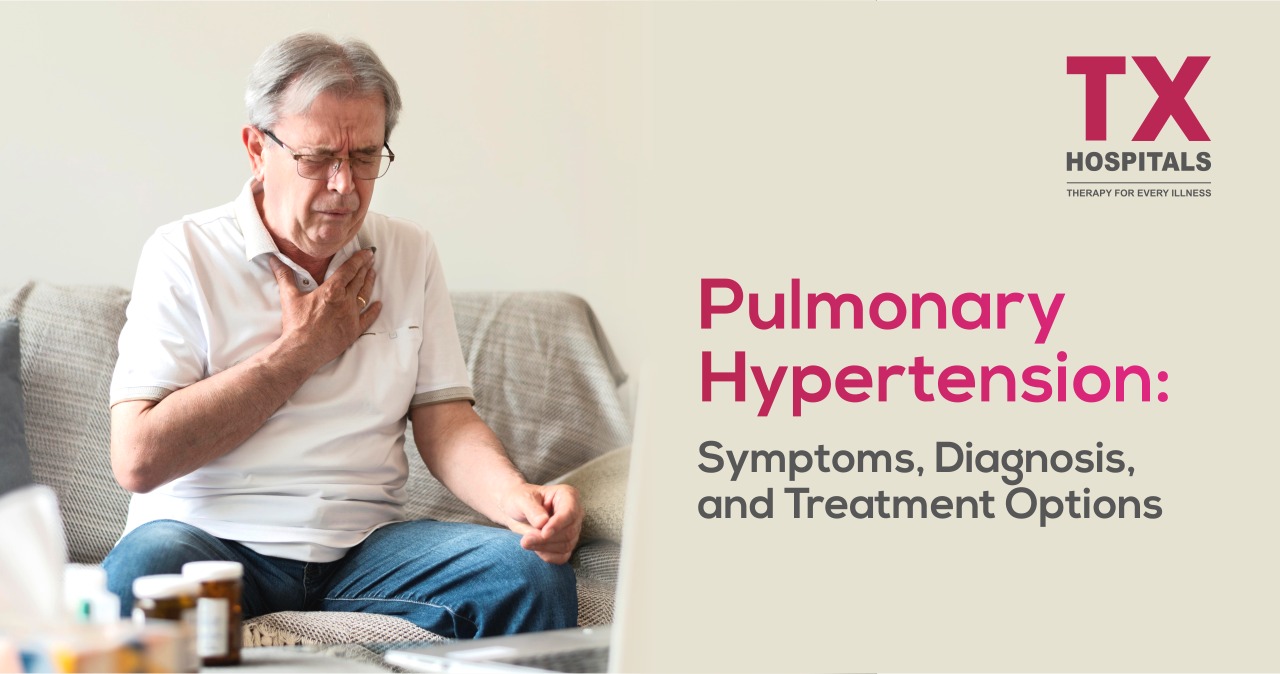Pulmonary Hypertension: Symptoms, Diagnosis, and Treatment Options
Pulmonary hypertension (PH) is a serious and often progressive condition characterized by high blood pressure in the arteries of the lungs. This condition can lead to significant health issues if left untreated. Understanding its symptoms, methods of diagnosis, and available treatment options is crucial for managing the disease effectively. For specialized care, consider reaching out to TX Hospitals by calling 9089-48-9089 to book an appointment with our pulmonology doctors in Hyderabad.
Understanding Pulmonary Hypertension
Pulmonary hypertension occurs when the blood pressure in the pulmonary arteries becomes elevated. These arteries carry blood from the heart to the lungs, and increased pressure can strain the heart and reduce oxygen flow throughout the body. There are five types of PH, classified based on their causes, including idiopathic, genetic, drug-induced, and associated with other conditions such as left heart disease or chronic lung diseases.
Symptoms of Pulmonary Hypertension
- The symptoms of pulmonary hypertension can vary widely and may develop slowly over time. Early symptoms might be mild, making early detection challenging. Common symptoms include:
Shortness of Breath: Initially occurring during physical activity and later at rest. - Fatigue: Persistent tiredness that affects daily activities.
- Chest Pain: Often described as a tightness or pressure in the chest.
- Swelling (Edema): Particularly in the ankles, legs, and abdomen.
- Dizziness or Fainting: Episodes of lightheadedness or syncope.
- Palpitations: A sensation of irregular heartbeats.
Diagnosing Pulmonary Hypertension
Diagnosing pulmonary hypertension requires a thorough evaluation by a healthcare provider. Several tests and procedures can help confirm the diagnosis and determine its severity:
- Echocardiogram: An ultrasound of the heart that can visualize the structure and function of the heart and pulmonary arteries.
- Right Heart Catheterization: A definitive test where a catheter is inserted into the right side of the heart and pulmonary artery to directly measure the pressure.
- Electrocardiogram (ECG): Records the electrical activity of the heart and can suggest the presence of PH.
- Chest X-ray: May show changes in the size and shape of the heart and pulmonary arteries.
- Pulmonary Function Tests (PFTs): Assess lung function and can help differentiate PH from other lung conditions.
- Blood Tests: To check for underlying conditions or contributing factors.
Treatment Options for Pulmonary Hypertension
While there is no cure for pulmonary hypertension, various treatments can help manage symptoms and improve quality of life. The choice of treatment depends on the type and severity of PH:
- Medications: Several classes of drugs can help reduce pulmonary artery pressure and improve heart function, including vasodilators, endothelin receptor antagonists, phosphodiesterase-5 inhibitors, and calcium channel blockers.
- Oxygen Therapy: For patients with low blood oxygen levels, supplemental oxygen can ease symptoms.
- Lifestyle Changes: Regular, moderate exercise and a heart-healthy diet can support overall cardiovascular health. Patients are often advised to avoid high altitudes and strenuous activities.
- Surgical Options: In severe cases, procedures such as atrial septostomy or lung transplantation might be considered.
- Pulmonary Rehabilitation: A structured program that includes exercise training, education, and support to improve physical and emotional well-being.
Seeking Treatment
- If you or a loved one are experiencing symptoms of pulmonary hypertension, early evaluation and treatment are essential. TX Hospitals offers comprehensive care with a team of experienced pulmonologist specialist in Hyderabad and state-of-the-art facilities. Our dedicated team is here to provide personalized care and support for managing pulmonary hypertension effectively.
- Pulmonary hypertension is a challenging condition, but with proper management and medical care, many patients can lead active and fulfilling lives. Don’t hesitate to reach out to use TX Hospitals for expert guidance and treatment options.










